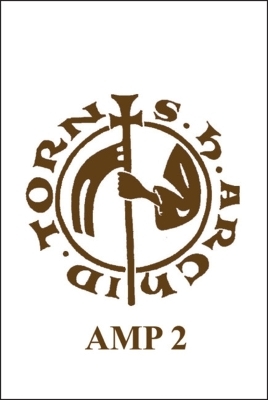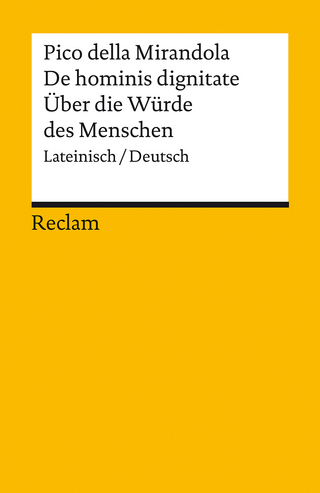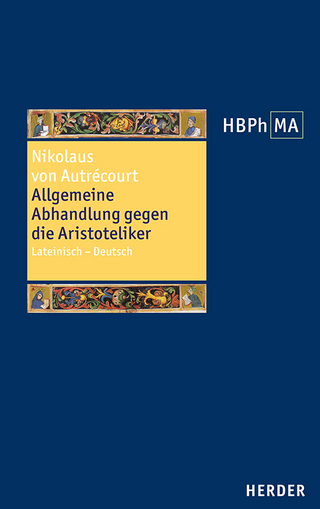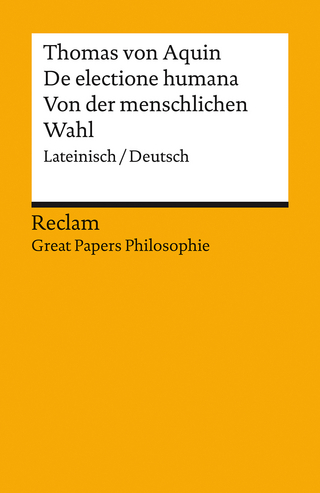
Henrici de Gandavo Quodlibet XV
Leuven University Press (Verlag)
978-90-5867-564-4 (ISBN)
Henry of Ghent's Quodlibet XV, his last Quodlibet before his death, was composed sometime after the fall of Acre (May 10, 1291) and Nicolas IV's letter Illuminet super nos (sent on August 1, 1291), both of which are referred to in this Quodlibeta. This Quodlibet would have been prepared for distribution shortly after the public disputation was delivered, either in Advent of 1291 or Lent of 1292. The sixteen questions treat a range of issues, e.g. the immaculate conception, the omnipotence of God, the nature of an "instance", the absolute and ordained powers of the pope and the nature of a just war. The positions of Henry in Quodlibet XV were influential. For example, nearly a century after its composition, Thomas de Rossy refers to this text of Henry in his De conceptione Virginis Immaculatae. The text was reconstructed based upon manuscripts copied from a first Parisian university exemplar, manuscripts whose model was probably a second Parisian university exemplar, and a manuscript which was in the possession of Godfrey of Fontaines, whose model may have been a nearly completed version of what would ultimately be a source of the first Parisian exemplar.
Girard J. Etzkorn is a former professor emeritus at St. Bonaventure University. He died in 2023. Gordon A. Wilson is professor emeritus at the University of North Carolina. He is the general coordinator of the Leuven edition of the 'Opera omnia' of Henry of Ghent.
Foreword
Critical study
Introduction
The Editions and the Manuscripts
Historical and Codicological Elements Used For the Establishment of the Text: The Text Examined Exteriorly
1. Quodlibet XV as a Text of Henry of Ghent
2. Quodlibet XV as a Text Edited by the University in Paris
A. The First University Exemplar
B. A Possible Second Exemplar
The General Relationships of the Manuscripts: The Text Examined Interiorly
1. The Isolated Accidents
2. The Common Accidents
A. A Second Exemplar Other Than the Parisian University Exemplar of 8 Pecia?
Manuscript 14 (PARIS, Bibl. Nat., lat. 15350): Independent of the University Exemplar Tradition
1. Manuscript 14 (PARIS, Bibl. Nat., lat. 15350): An Incomplete Text of Quodlibet XV
2. The Corrections to Manuscript 14 in Quodlibet XV
3. The Model of Manuscript 14
The First Parisian Exemplar
The Reconstruction of the Critical Text
The References in Quodlibet XV
The Genesis of the Exemplars, Represented by a Diagram
Technique of the Edition
-- Symbols: 1. In the Text Itself
2. In the Critical Apparatus
-- Abbreviations: 1. In the Critical Apparatus
2. In the Apparatus of Citations
Sigla of the Manuscripts
QUODLIBET XV
q. 1. Utrum Deus posset facere quod vacuum esset
q. 2. Utrum Christus ascendat super omnes caelos
q. 3. Utrum omnis actio humana Christi sit supernaturalis
q. 4. Utrum operatio qua convertebatur cibus in corpus Christi fuerat naturalis
q. 5. Utrum relatio habeat debilius esse inter praedicamenta
q. 6. Utrum sit possibile ponere plures formas et diversas accidentales differentes solo numero simul in eodem subiecto indivisibili
q. 7. Utrum aliquod agens creatum in agendo posset attingere substantiam primae materiae
q. 8. Utrum operatio intelligendi qua angelus vel mens humana intelligit se differat a se
q. 9. Utrum intellectio qua angelus aut mens humana intelligit se sit sibi essentialior quam illa qua intelligit Deum
q. 10. Utrum anima gloriosa, resumpto corpore glorioso, possit videre obiectum sensibile absque sensu medio
q. 11. Utrum homo generatus a viro et muliere, si assumeretur in unitate personae a Filio Dei, esset filius viri illius
q. 12. Utrum magister vel scholaris qui tenetur ad horas canonicas, si dimittat illas dicere uno die propter studium et lectiones ex proposito et spe recuperandi et dicendi illas alio die, peccet mortaliter
q. 13. Utrum conceptio Virginis Mariae sit celebranda ratione conceptionis
q. 14. Utrum indulgentiae praelatorum tantum valeant quantum sonant
q. 15. Utrum licitum sit magistris disputare de potestate praelatorum
q. 16. Utrum miles irruens praevolando consortes suos in hostium exercitum faciat opus magnanimitatis
TABLES
Works Cited by Henry
Onomastic Table
Manuscripts Cited
Quoted Publications
Table of Contents
| Reihe/Serie | Ancient and Medieval Philosophy–Series 2 |
|---|---|
| Verlagsort | Leuven |
| Sprache | englisch |
| Maße | 152 x 229 mm |
| Themenwelt | Geisteswissenschaften ► Philosophie ► Philosophie des Mittelalters |
| ISBN-10 | 90-5867-564-5 / 9058675645 |
| ISBN-13 | 978-90-5867-564-4 / 9789058675644 |
| Zustand | Neuware |
| Haben Sie eine Frage zum Produkt? |
aus dem Bereich


